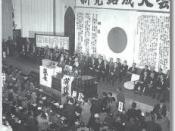Bureacracy in Japan Ever since its establishment in 1955, the Liberal Democratic Party (LDP) has maintained its one-party rule, and it continues to hold the highest executive power, being the prime ministership, and the cabinet. The LDP's one party rule has shaped the Japanese political economy by creating very close ties between the political, bureaucratic, and industrial/business structure. This has been done through the auspices of institutions such as Ministry of Agriculture, Forestry and Fisheries (MAFF), Ministry of International Trade and Industry (MITI) and the Keirietsu/Ziabatsu (or other such interest groups). The LDP's diversion of government funds to dissatisfied groups (i.e. "pork barrel" politics) and the creation of very close personal and financial linkages between government and industry served as the driving force in creating a unique Japanese political economy where business and politics became essentially indistinguishable. Politicians and the bureaucracy were considered to be the most politically influential forces in Japan.
However, there was more emphasis on the politicians, especially among the LDP members.
In the private sector, the LDP provided special benefits in return for consistent political support. For example, there was extensive reemployment of senior bureaucrats in big business and politics after their retirement. These people are called the amakudari ("decent from heaven"). They deepened the communication between the government and the private sector, giving the private sector a way to manipulate the government or vice versa. Some amakudari in the LDP became members of the zoku (tribes), one of the party factions . The zoku were party officials who developed enough knowledge to force the bureaucracy to serve both national and party interests.
The LDP highly depended on the farmers for electoral support, which explains their loud concerns to agricultural policies. But there was also extensive involvement in the agricultural sector by MITI and MAFF. MITI...


